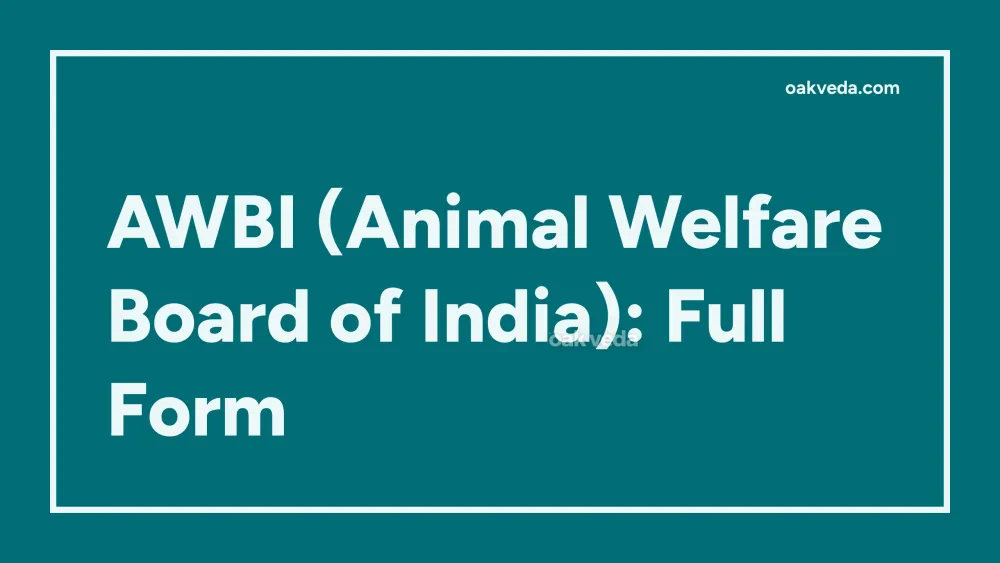
What is the Full Form of AWBI?
The full form of AWBI is Animal Welfare Board of India. This statutory body plays a crucial role in promoting animal welfare and preventing cruelty to animals across the country.
What is Animal Welfare Board of India?
The Animal Welfare Board of India (AWBI) is a statutory advisory body established under the Prevention of Cruelty to Animals Act, 1960. Founded in 1962, it operates under the Ministry of Fisheries, Animal Husbandry and Dairying, Government of India. The AWBI's primary mandate is to prevent unnecessary pain or suffering inflicted on animals and to promote their well-being throughout the nation.
Origin and Development of Animal Welfare Board of India
The AWBI was established as a result of growing concerns about animal welfare in India. Its inception can be traced back to the enactment of the Prevention of Cruelty to Animals Act, 1960. Since its establishment, the board has evolved to address various animal welfare issues and has expanded its reach across the country.
How does Animal Welfare Board of India work?
The AWBI functions as a central authority on animal welfare matters in India. It works in collaboration with state governments, non-governmental organizations, and other stakeholders to implement animal protection laws and promote animal welfare. The board is headquartered in Chennai, Tamil Nadu, and operates through regional offices across the country.
Functions of Animal Welfare Board of India
The AWBI carries out several essential functions to fulfill its mandate:
- Policy Advice: Advising the government on animal welfare laws and policies.
- Grants and Financial Assistance: Providing financial support to animal welfare organizations and individuals working towards animal protection.
- Education and Awareness: Conducting campaigns and programs to raise public awareness about animal welfare issues.
- Enforcement: Ensuring compliance with the Prevention of Cruelty to Animals Act and other relevant laws.
- Research Promotion: Encouraging and supporting research in animal welfare.
- Guidelines and Standards: Developing and issuing guidelines for the proper treatment of animals in various settings.
Applications of Animal Welfare Board of India
The AWBI's work has wide-ranging applications across various sectors:
- Domestic Animals: Promoting the welfare of pets and working animals.
- Livestock: Ensuring humane treatment of farm animals.
- Wildlife: Supporting conservation efforts and addressing human-wildlife conflicts.
- Research Animals: Overseeing the ethical treatment of animals used in scientific research.
- Entertainment Industry: Regulating the use of animals in films, circuses, and other forms of entertainment.
Features of Animal Welfare Board of India
Key features of the AWBI include:
- Statutory Authority: Empowered by law to take action on animal welfare issues.
- Nationwide Reach: Operating across India through regional offices and partnerships.
- Multi-stakeholder Approach: Collaborating with various organizations and individuals.
- Comprehensive Focus: Addressing welfare issues for all types of animals.
- Financial Support: Providing grants to support animal welfare initiatives.
Benefits of Animal Welfare Board of India
The AWBI's work brings numerous benefits:
- Improved Animal Health: Promoting better care and treatment of animals.
- Public Health: Indirectly contributing to public health by addressing issues like rabies control.
- Ecological Balance: Supporting wildlife conservation efforts.
- Ethical Treatment: Fostering a more compassionate society through animal welfare education.
- Legal Framework: Strengthening animal protection laws and their implementation.
Limitations or Challenges of Animal Welfare Board of India
Despite its efforts, the AWBI faces several challenges:
- Limited Resources: Insufficient funding and manpower to address all animal welfare issues effectively.
- Enforcement Difficulties: Challenges in ensuring compliance with animal welfare laws across the vast country.
- Cultural Barriers: Overcoming traditional practices that may conflict with animal welfare principles.
- Awareness Gaps: Lack of widespread public awareness about animal welfare issues and laws.
- Coordination Challenges: Difficulties in coordinating efforts with multiple stakeholders and government bodies.
Future Developments in Animal Welfare Board of India
The AWBI continues to evolve and adapt to emerging challenges:
- Technology Integration: Leveraging digital platforms for better monitoring and reporting of animal cruelty cases.
- Enhanced Collaboration: Strengthening partnerships with international animal welfare organizations.
- Policy Updates: Advocating for stronger animal protection laws and their implementation.
- Expanded Outreach: Increasing public awareness through social media and grassroots campaigns.
- Research Focus: Promoting more scientific studies on animal welfare to inform policy decisions.
FAQs on AWBI Full Form
-
What is the primary goal of the Animal Welfare Board of India? The primary goal is to prevent unnecessary pain or suffering to animals and promote their welfare across India.
-
How can individuals support the AWBI's mission? Individuals can support by reporting animal cruelty, volunteering with local animal welfare organizations, and spreading awareness about animal welfare issues.
-
Does the AWBI provide financial assistance for animal welfare projects? Yes, the AWBI offers grants to registered animal welfare organizations and individuals for various animal welfare activities.
-
How does the AWBI address the issue of stray animals? The AWBI supports Animal Birth Control (ABC) programs and vaccination drives to manage stray animal populations humanely.
-
Can the AWBI take action against animal cruelty cases? While the AWBI itself doesn't have direct enforcement powers, it works with law enforcement agencies to address animal cruelty cases and ensure proper implementation of animal protection laws.
In conclusion, the Animal Welfare Board of India (AWBI) plays a vital role in safeguarding the rights and well-being of animals across the country. Through its various initiatives, policy recommendations, and collaborative efforts, the AWBI continues to work towards creating a more compassionate and animal-friendly society in India.
You may be interested in:

